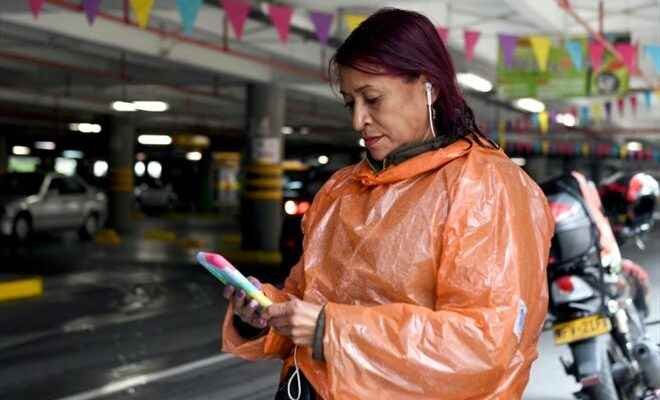Luz Miryam Fique, 57, a motorcycle courier and president of the Union of Digital Platform Workers (UNIDAPP), makes a delivery in Bogota on October 5, 2022 (AFP/DANIEL MUNOZ)
Luz Miryam Fique is one of the 50,000 “rappitenderos” in Colombia, named after the home delivery company Rappi, sometimes paid less than one euro for races of several kilometers.
No contract binds these deliverers – the vast majority of whom travel by bicycle – to the local leader in the home delivery market, founded in 2015 and which today weighs 5.25 billion dollars. Rappi is present in eight other Latin American countries: Mexico, Costa Rica, Peru, Ecuador, Chile, Argentina, Uruguay and Brazil.
Purple hair under his helmet and an orange plastic suit serving as a raincoat, Luz Miryam, 57, left his office job five years ago because, at the time, deliveries paid well: “around thirty euros per day without too much effort”.
“Today to earn that, you have to work at least 16 hours, and go hard,” says the delivery girl, earphone in her ear, who receives a new order on her phone.
“What! Nine kilometers for 7,000 pesos (1.50 US$). An order like this before was worth 18,000 pesos (3.80 US$),” she says.
For his part, Rappi assures AFP that a delivery man “can generate double the hourly wage compared to the minimum wage ($220/month); that is to say that they earn more than 70% of the Colombian population”.
But at what price, because the competition is fierce.
“If there was anything that came at the right time for Rappi, it was the pandemic. Since then, they have done what they want with us,” laments Luz Miryam.
The lockdowns have left many Colombian workers without income who have turned to Rappi to survive. And more than 2 million Venezuelan migrants have arrived in Colombia, fleeing the misery in their country.

Luz Miryam Fique, 57, a motorcycle courier and president of the Union of Digital Platform Workers (UNIDAPP), makes a delivery in Bogota on October 5, 2022 (AFP/DANIEL MUNOZ)
An abundant workforce which has enabled Rappi to drive delivery prices down when demand is strong.
“This city is chaotic, shopping at the supermarket can take you two hours because of the crazy traffic. Having someone to do it for you at a low price fills a need”, explains Natalia Ramirez Bustamante, professor of law work at the University of the Andes.
According to her, the platforms “take advantage of the fact that it is very difficult or even impossible for a migrant to find a place in the formal economy” because “in Colombia formal jobs are rare, even for Colombians”.
“Only 14% of delivery people would have a formal job if digital platforms did not exist (and) 44% would be unemployed”, defends the multinational.
– Hopes for change –
Despite everything, Luz Miryam continues to walk the streets of Bogota with her backpack, ignoring the dangers between insecurity and road accidents which particularly affect two wheels.
His motorcycle once skidded in the rain, because “of a guy who took a wrong turn”. She was “not able to work for 8 days”.
Luz Miryam also defends the other delivery people within the Unidapp union, of which she is the president. Regulation of platforms and better remuneration are its main concerns. She is especially monopolized by this “system of self-acceptance of orders” where the deliverers cannot refuse the delivery, whatever the price and the distance.

Luz Miryam Fique, 57, a motorcycle courier, waits for a new delivery order, in Bogota on October 5, 2022 (AFP/DANIEL MUNOZ)
“Every day, 30 or 40 delivery people whose accounts have been blocked by Rappi”, for having refused deliveries or having joined a union, “contact us and we help them (…) until legal action if necessary”, explains the president of the only union officially recognized by Rappi.
Fully invested, she “hopes to see change”.
His wishes may soon come true. This week the Senate considered the drafting of a bill to “regulate not only Rappi but all digital platforms (…) so that they do not abuse their employees”, indicates Senator Mauricio Gomez Amin.
© 2022 AFP
Did you like this article ? Share it with your friends with the buttons below.




